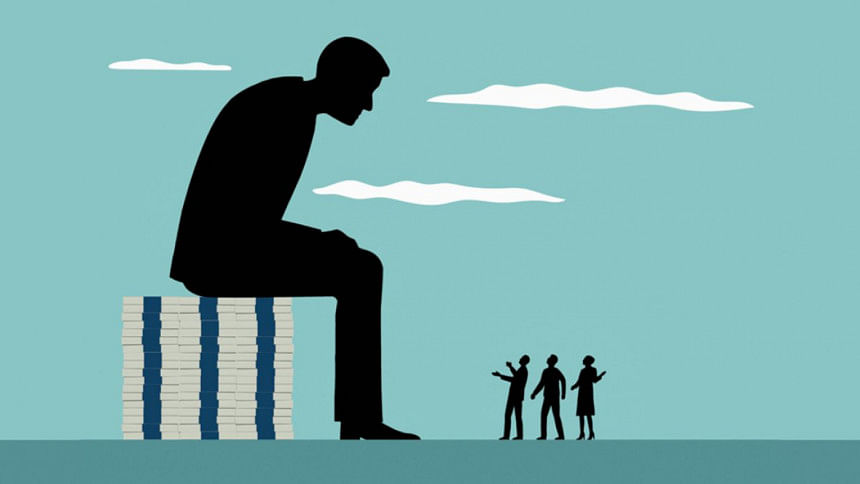Why Bangladesh's inequality is likely to rise

The issues of growing income inequality and unequal distribution of wealth between the rich and the poor have lately gained traction across the west. Oxfam's yearly inequality report serves as the most damning indictment of this rise in disparity. Eighty-two percent of the entire global wealth created last year, the report estimates, went straight into the pockets of the richest one percent of the world's population. The poorest 50 percent, on the other hand, received zero percent of that wealth.
Social democrats or socialists on the left aisle of the political spectrum blame inequality as the primary source of many social discontents that exist in western societies. Liberals, however, attribute these resentments to a widespread distaste for pluralism, multiculturalism, migration, globalisation, etc.
The debate over what influenced people most to hate the existing political system is far from over, but across the subcontinent, including Bangladesh, the debate has hardly any presence at all.
The latest Household Income and Expenditure Survey released by Bangladesh Bureau of Statistics (BBS) found that the income share of the poorest five percent of our population was 0.23 percent of overall income, a sharp fall from 2010 when it was 0.78 percent. In contrast, the richest 5 percent's share of income grew to 27.89 percent, up from 24.61 percent in 2010. This basically means that the bottom five percent's share of national income has decreased, whereas the richest five percent's has increased.
While the BBS survey mainly sheds light on growing income inequality, wealth inequality is even worse. According to estimates by the Centre for Policy Dialogue (CPD), wealth inequality in terms of Gini coefficient—an economic term to gauge income or wealth inequality on a scale of 0 to 1, in which 1 represents perfect inequality and 0 signifies perfect equality—stands at a staggering 0.74, whereas the Gini coefficient for income inequality is 0.48.
While the existing data is worrying enough, real inequality is likely to be worse because the richest in our society are reluctant to reveal their actual wealth and income.
In the last Dhaka mayoral election, two contestants, both business tycoons, refused to include their expensive cars in their wealth statements. They argued that these cars belonged to their companies, which, however, happened to be owned by none other than themselves.
China-based Hurun Global in 2017 named one Bangladeshi businessman in its global rich list, estimating that his assets would be worth USD 1.3 billion. The businessman conceded that the company his family owns may have had assets worth the figure but that he "personally" does not own that much wealth.
They pretend that their "personal" wealth and that of their companies are somehow different, even though it's pretty clear that both are more or less the same thing. For all their wealth, it's hard to find too many wealthy businessmen in the list of the top taxpayers. The man who paid the highest amount of tax last year was the owner of a chewing tobacco company.
The tricky part here is that many among the super-rich base their business on massive loans taken from banks. When you show your working capital coming from loans, you are more likely to be exempted from paying taxes. In addition, taxing the rich is one of the least priorities of our major political parties.
Raising minimum wage or living wage is a popular and important issue in the west, but no major parties—not even the opposition—in Bangladesh would voice in favour of increasing the wage of garment workers. No one, after all, wants to disturb their donors.
Far from taxing the richest, successive governments rather succumb to the business community's demands to reduce the existing taxes in the name of providing "incentives". When labourers take to the streets to demand a wage increase, the government on behalf of industry leaders, deploy forces to crush their voices.
According to a study by the Finance Ministry, 45-65 percent of the assets in our economy are not taxed. As the super-rich have ample ways to evade their dues, a large portion of the government's revenue comes from indirect taxation such as value added taxes (VAT), which is applicable to all people regardless of their income. Those who are poor spend a large proportion of their income, whereas the rich spend a very small portion of theirs.
"One of the prime philosophies of taxing is to reduce income inequality," Mustafizur Rahman of CPD told BBC. The failure to tax the wealthiest is, therefore, a major cause of the widening inequality.
Our country was supposed to be a progressive country. Our founding fathers included "socialism" in addition to democracy as one of our founding pillars in the constitution.
Most of our finest universities still run with public money. Yet, we do not regulate private universities that charge students hefty fees. We have public hospitals across the country, but they provide low quality service, while top private hospitals charge its clients as much as five-star hotels do.
Of late, we have been in love with a new model of project development called "Public-Private Partnership," despite the fact that the objective of the government and private entities would collide, theoretically, rather than align. Unlike the private sector, the government isn't supposed to be a profit-making enterprise while investing in public welfare.
Our economy is neither capitalistic nor socialistic. This is a conundrum we may have chosen to live with, but the cost is too steep. At this phase of our economic history, we are supposed to be experiencing very high employment growth, investment, and a higher standard of living, but what we are experiencing, instead, is growing inequality, credit crunch, rampant corruption, massive outflow of money, etc. The crisis that advanced economies experience during the phase of maturation is all set to hit ours in its nascent stage.
Nazmul Ahasan is a member of the editorial team of The Daily Star.




Comments